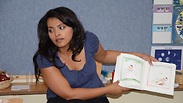
Illustration
Photo: Mohammed Shinawi
Majd Abu Diab crouches next to Jacqueline, an older Jewish woman in a wheelchair who has lost the power of speech. He sings a song in Arabic as he drums his fingers on her wheelchair. Her eyes light up and her head bobs along in tune. At the end of the song, they hug each other.
In the next room, another female patient is thrilled to see Abu Diab, who everyone here at Hadassah Hospital in Jerusalem calls Glory, the English translation of Majd. He reminds her that she has physical therapy soon, and says he will come back and get her.
“Remember, you promised to blow dry my hair later,” she says coquettishly.
Abu Diab is three months into a year-long stint as a volunteer in Israel’s National Service, an alternative to compulsory military service in Israel. Most of those exercising this option are Orthodox Jewish women who are not comfortable being with men outside their family. But a growing number are Arabs, both those who are citizens of Israel and even those, like Diab, who are residents of Jerusalem although he is a Jordanian citizen, are opting to participate.
“I come from a rich family where I got everything I wanted and I never gave anything to anyone,” he told The Media Line, wearing a white lab coat, and his hair cut in the latest fashion. “I decided I wanted to give something back to this earth.”
He volunteered at a nursing home in the West Bank, bringing gifts to the residents there. He grew especially close to one resident, and when she died, he found it difficult to go back. He tried to join the Israeli army but says that he was rejected because he was Arab. He spent a few months learning Hebrew, which he never learned in high school. Then he received this posting, where he works basically as an orderly. Like all National Service volunteers, he receives a small stipend of about $200 per month, which he supplements by working in a shoe store in the evenings.
“I lift the patients in and out of wheelchairs and I make sure they get to their appointments,” he said. “Sometimes I bring supplies to the ward.”
But more than that, he makes the patients happy.
“Yesterday, one of the patients had a birthday and Glory brought in balloons and a card for her,” Tami Buzaglo told The Media Line. “He is always smiling and he makes everyone laugh. We just love having him here.”
While most Jewish citizens of Israel are conscripted (girls for two years, boys for three), Arab citizens of Israel are exempt, although certain sectors including the Druze and the Bedouin volunteer for military service. About 50 Christian Arab citizens join the army each year, even though most Arab citizens of Israel oppose this, as they see the Israeli army as perpetuation Israel’s control over the West Bank and Gaza Strip, the areas Israel acquired in 1967, along with the more than three million Palestinians who live there today.
When it comes to national service, Arab opinion is divided, analysts say. In most cases, national service is done in local Arab communities, in schools and hospitals. It especially offers a chance for girls, who are sheltered in traditional Arab culture, to learn skills while still living at home.
“National service is an entry into Israeli society,” Sammy Smooha, a professor of sociology at Haifa University told The Media Line. “Especially for girls, it offers a good option for the time after high school. Boys can work or study, but Arabs still like their girls to stay close to home.”
The numbers have been steadily increasing. In the past year, the number has jumped 30 percent to more than 4,000 non-Jews serving. When they finish they receive the same benefits that anyone who has served in the army receives, including a grant of several thousand dollars, and subsidized college tuition.
Smooha says that the Arab leadership has discouraged national service, because it is run by Israel’s Defense Ministry. But more and more young Arabs are joining the ranks, seeing it as a way to achieve personal fulfillment and to get ahead in Israeli society.
Abu Diab says he has not experienced any anti-Arab feeling in the hospital from either staff or patients.
“We don’t look if you are Arab, Christian, Muslim or Jewish,” he told The Media Line. “Everyone welcomed me.”
He says he feels he is making a real difference in people’s lives.
“I sit with them, I talk with them, I call people and visit them even after they go home,” he said. “I feel like I am not the person that I was when I started.”
He says he hopes that more Palestinians will join the program.
“I think everyone should do this to see what you can do,” he said. “I am learning so much, and when I see people smile, it makes me so happy.”
Article by Linda Gradstein
Reprinted with permission from The Media Line















